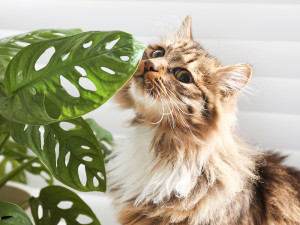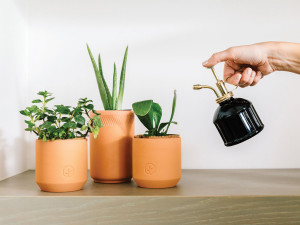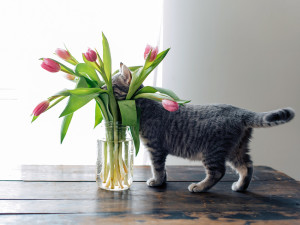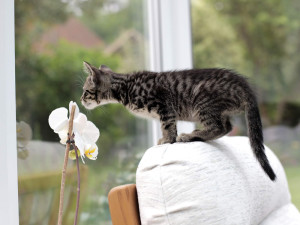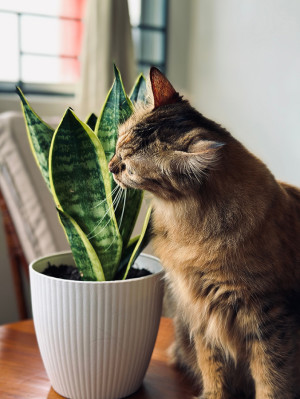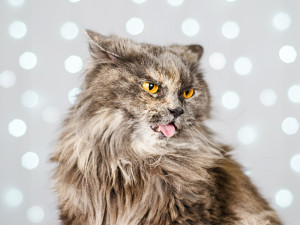The 10 Best Non-Toxic House Plants for Cats
Cats love the crunch of a houseplant. These will do them no harm.
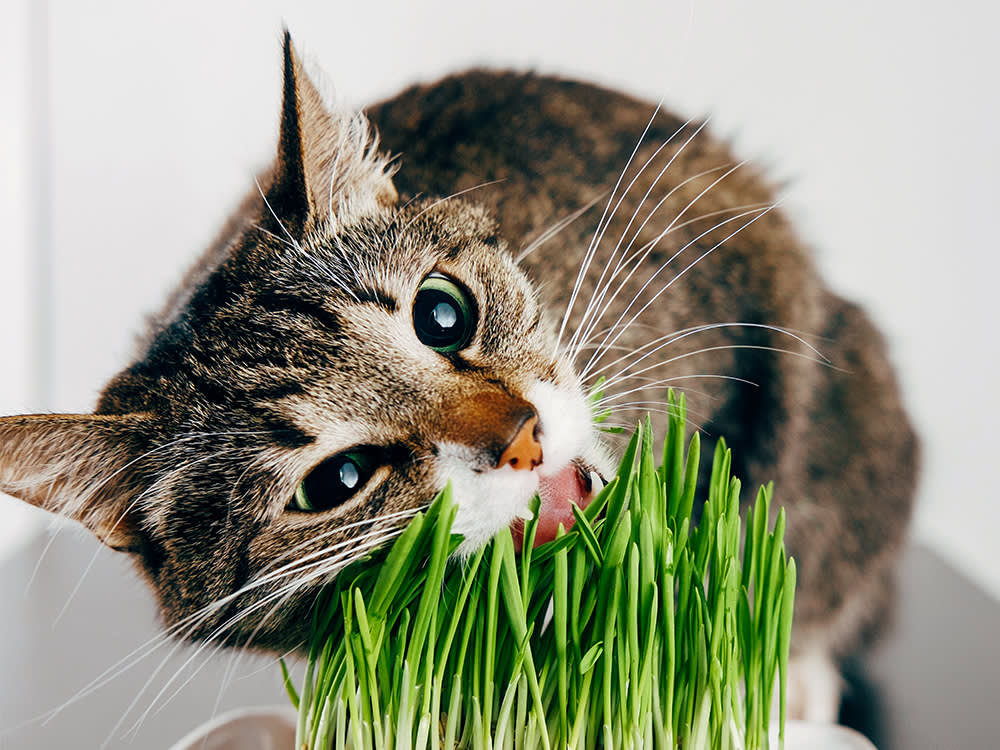
share article
In This Article:
The 10 Best Cat-Friendly Houseplantsopens in a new tab How to Keep Cats Out of Houseplantsopens in a new tab Toxic Plants for Catsopens in a new tab What if You Suspect Your Cat Ate a Toxic Plant?opens in a new tab
Choose cat-friendly plants to create a safe environment for your cat. Popular non-toxic indoor plants include rattlesnake plants, spider plants, boston fern, polka dot plant, watermelon peperomia, money tree, parlor palm, and cat grass.
Pet parents know every cat has their quirks, and that extends to what they like to snack on. It’s easy to figure out that a plastic bag or a phone charger are not part of a balanced dietopens in a new tab, but what about plants? Cats are obligate carnivores, which means they need meat in their diet to survive.
Still, some feline friends just seem to love the crunch of a houseplant. Because it’s next to impossible to keep a determined cat away from a windowsill, you can decorate your home with non-toxic houseplantsopens in a new tab that are safe if your cat decides to take a nibble. Here are 10 of the best indoor plants not toxic to cats.
The best cat-friendly Plants
1. Rattlesnake Plant
The rattlesnake plant (Goeppertia insignis, formerly Calathea lancifolia) poses no toxicity risk to cats and should not be mistaken for the toxic snake plantopens in a new tab (Sansevieria trifasciata), despite their similar names. The uniquely colored leaves of the rattlesnake plant are harmless, making it a safe choice for homes with feline companions. They do well with medium, indirect light and lots of water.
2. Spider plant
Common in waiting rooms and bathrooms, spider plantsopens in a new tab (Chlorophytum comosum) are a great way to add some low-fuss foliage to your home. They like indirect light and a little humidity, so hanging them near your shower can be a great choice.
3. Boston fern
For a stately aesthetic, you can’t go wrong with a Boston fern (Nephrolepis exaltata). Also known as a sword fern due to the long, blade-like fronds, this is a low-maintenance option that your cat can bite and bat at to their heart’s content. The Boston fern is a great option for pet parents searching for hanging plants that are not toxic to cats.
4. Polka dot plant
Officially named Hypoestes phyllostachya, it’s easy to see where the punnier name came from. The speckled leaves come in a variety of colors (from white to pink to purple), and indirect sunlight with frequent misting will keep it vibrant and vital.
5. Watermelon peperomia
Another popular plant that’s not toxic to cats is the watermelon peperomia (Peperomia argyreia). This whimsical plant gets its name from the distinctly patterned leaves; and a little nibble on this watermelon variety won’t result in spit-up kibbleopens in a new tab. Medium, indirect sunlight and regular watering will keep those leaves looking ripe enough to eat.
6. Money tree
The money tree (Pachira aquatica) is pet-friendly, air-purifying, and said to bring good luck and positive energy into your home. It’s a perfect indoor plant that can give any room a tropical feel. Money trees can grow to be several feet, making them a welcome addition for pet parents seeking large indoor plants not toxic to cats.
7. Parlor palm
Belonging to the same family as coconut trees, the parlor palm (Chamaedorea elegans) is a reliable indoor option that thrives with plenty of sunlight and weekly waterings. Don’t worry, you won’t have coconuts falling on the floor, but you should leave plenty of headroom as these can grow to be over six feet tall.
8. Venus flytrap
For pet parents seeking a distinctive, quirky, and cat-friendly houseplant, the Venus flytrap (Dionaea muscipula) is an excellent choice. These carnivorous plants can be a bit finicky though, so be ready for an indoor gardening challenge.
9. Orchid
Orchids (Orchidaceae spp.) offer a unique option for pet parents wanting to add a touch of sophistication into their home while still considering their cat's safety. While orchids usually bloom only once a year, their flowers stick around for several months. Managing orchids can be a challenge, as these plants are notoriously easy to over-water. Some orchid lovers rely on ice cubes to slowly provide moisture; as the ice cubes melt, the plant absorbs the water.
10. Cat grass
A list of cat-safe plants wouldn’t be complete without cat grass. Technically, it’s a grass mixture grown from wheat, barley, oats, and rye, and specifically designed for kitty consumption. Due to the high fiber content, cat grass can even aid with digestion and (fair warning) help cats work out hairballsopens in a new tab. Shop our list of the top seven cat grass grow kitsopens in a new tab.
How to keep cats out of houseplants
The easiest — and least fun — way to keep cats out of houseplants is to simply not have them. But that’s no fun, so here are a few tips.
Aim high: Keep plants up high in areas that a cat can’t access by jumping or climbing.
Build a barrier: Surround your plants with double-sided tape, aluminum foil, or other deterrents that make attacking your plant not worth it to your cat.
Use scent: Some cats are repelled by strongly scented plants, but others are attracted to them, so this won’t work for all cats.
Secure the soil: Cover the soil of houseplants with large decorative rocks, aluminum foil, or pinecones to make it less inviting for digging. This can help discourage cats from treating the plant's soil as a litter box.
Provide alternatives: A bored cat can be a curious (and destructive) cat. Make sure your cat has plenty of options for play and entertainment.
Spritz a safe deterrent: Spraying cat-safe deterrent sprays on and around plants may help keep your cat away.
Toxic plants for cats
For cat parents, safeguarding their kitties from household hazards, including toxic houseplantsopens in a new tab, is a priority. While they all can’t be listed here, here are some common ones to be aware of:
True lilies (Lillium spp. and Hemerocallis spp., including Easter lily, Stargazer Lily, Tiger Lily Dragon Lily, and Daylily)
Aloe vera
Dieffenbachia
Snake plant (Sansevieria trifasciata)
Sago palm (Cycas revoluta)
Poinsettiaopens in a new tab (Euphorbia pulcherrima)
Bird of paradise (Strelitzia reginae)
Lavender (Lavendula spp.)
Dragon tree (Dracaena marginata)
Cutleaf philodendron (Monstera deliciosa)
Tulipsopens in a new tab (Tulipa spp.)
What if you suspect your cat ate a toxic plant?
If you suspect that your cat ate a toxic plant, contact your veterinarian or animal poison control right away. Be prepared to identify the plant or give as much information as possible to help whomever you contact so they can identify the plant.
As a preventive measure, refrain from bringing any plants into your home if you don’t know their species or name. If you discover that you have a toxic plant or flower, promptly rehome it or relocate it to an area inaccessible to your cat.
FAQs (People also ask):
Why do cats eat houseplants?
Some cats enjoy the taste and texture of houseplants, so they enjoy munching on them. It’s up to cat parents to ensure that their cat doesn’t have access to unsafe houseplants.
Do cats know not to eat toxic plants?
Cats do not instinctively know not to eat toxic plants. Some cats enjoy chewing on any kind of plant they have access to, regardless of whether it’s safe or not. Keep all toxic plants, like lilies, aloe vera, and snake plants away from cats.
Are indoor herbs safe for cats?
Some indoor herbs, like sage and thyme, are non-toxic for cats, but others, like oregano and lemongrass, are toxic. Cat parents should research before keeping indoor herbs (ASPCA is a good startopens in a new tab) and remember that any herb can cause GI upset in cats.
References:
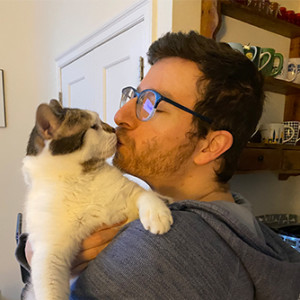
Jeremy Gundel
Jeremy Gundel is a writer and comedian from New York City. He’s a veteran performer at the Magnet Theater, been a featured contributor for CollegeHumor, McSweeney’s Internet Tendency, and performed stand-up in bars, basements, and basements of bars. He lives with his wife and two freeloading cats.

Dr. Alycia Washington, DVM, MS
Alycia Washington, DVM, is a small animal emergency veterinarian based in North Carolina. She works as a relief veterinarianopens in a new tab and provides services to numerous emergency and specialty hospitals. Dr. Washington is also a children’s book author and freelance writer with a focus on veterinary medicine. She has a special fondness for turtles, honey bees, and penguins — none of which she treats. In her free time, Dr. Washington enjoys travel, good food, and good enough coffee.
Related articles
![cat sniffing a plant]() opens in a new tab
opens in a new tab10 Plants Toxic to Cats
These plants might be beautiful, but they’re deadly to feline foragers.
![A curious kitty playing with a vase of tulips.]() opens in a new tab
opens in a new tabAre Tulips Toxic to My Cat?
This Mother’s Day, keep these flowers far away from your cat.
![Half-bengal kitten indoors smelling white orchid flowers in a conservatory.]() opens in a new tab
opens in a new tabAre Orchids Toxic to Cats?
Find out whether you can get that elaborate flower arrangement—or if you should skip it.
![Closeup portrait of calico cat sitting on home kitchen room table by pink rose flowers in vase, windows with blinds.]() opens in a new tab
opens in a new tabAre Roses Toxic to My Cat?
Let’s just say this: There’s no excuse for your partner not to bring you a bouquet of these.
![A brown cat with a snake plant.]() opens in a new tab
opens in a new tabAre Snake Plants Toxic to My Cat?
If you have a beloved snake plant, this answer will be a bummer.
![grey and white cat with tongue sticking out]() opens in a new tab
opens in a new tabWhy Does My Cat Keep Throwing Up?
Here’s when you should worry.
